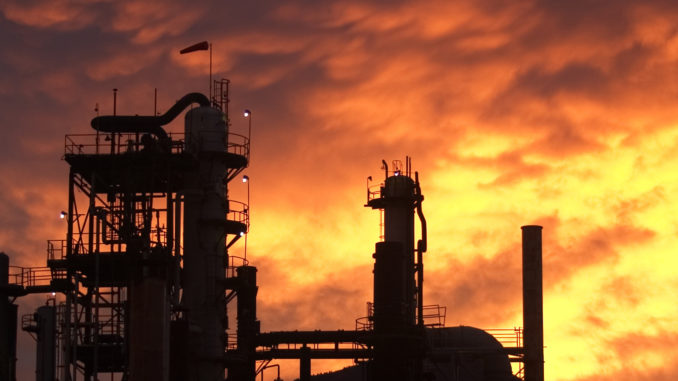
The times are a changin’ in the oil and gas business, and the environment is the driving force. The days of dirty smoke and air pollutants are now being replaced by steam and near-zero emissions thanks to major advancements in environmental control technology. Although reducing industry regulations might be an unintended consequence of the current administration, there is one company that welcomes regulation, and are going to great lengths to lower emissions.
“Part of the process here is trying to get out of the industry’s mode of taking 50-year-old technology and putting an air quality or water quality band aid on it,” William Prentice said. “We’ve gone through and entire process of reviewing designing parts of the refinery to somewhat older specifications and then rejecting all of that because there is so much more that is now available.”
Prentice is the CEO of Meridian Energy Group, the company behind the greenfield Davis Refinery coming to Belfield, ND. He is experiencing firsthand how much technology has changed over the past several decades, specifically with regard to environmental technology. Trying to incorporate 50 years of technological advancements into the Davis Refinery is doable, but nonetheless a daunting task.
“The issue at hand is that all these technologies have been developed over the past several years to make refineries cleaner, though they have never been comprehensively applied to a single grassroots project. That’s what we are doing,” Prentice said. “This is the first time in the industry that it has happened – and we consider it our job to lay the groundwork.”
Every change and tweak that Meridian Energy makes to the Davis Refinery’s infrastructure is another example of setting a new industry standard. This is a responsibility that Prentice does not take lightly, and sees the ongoing changes to the refinery more as an evolution for the entire industry.
“The opportunity has been very, very gratifying, but it has been hard to grasp when you approach a project like this in a historically consistent way,” Prentice said. “Turning this refinery from a more classic design and converting it to a pure clean refinery design leveraging the best control refinery technology we’ve developed is an industry-changing event.”
Meridian Energy has made several improvements to the Davis Refinery design, which significantly dropped emissions below its already industry-leading levels. With these changes to the refinery design, an amendment to the Permit to Construct (PTC) application was filed with the state. Prentice sees these changes as necessary steps to ensure the air, water and overall environmental health will be addressed.
“The application that was filed October of last year was for a very clean refinery,” Prentice explained. “That’s the first time any major refinery has ever filed permits based on being a synthetic minor source.” The amendment submitted last week made it even cleaner.
Being a minor source is a very important classification for the Davis Refinery. Actually, it is groundbreaking, and Meridian Energy Group understands the historical significance on multiple levels.
“A synthetic minor source requires a lesser timeframe or a shorter schedule for approval, but still requires us to provide the same support and engineering documentation to validate our testing and design to achieve these greatly diminished emission levels,” Prentice said. “The amendment to the application has established us as firmly as a minor source.”
Prentice added that they have streamlined the plant’s designs, and in some cases, even reduced the low emissions by 30%.
“The bar is being raised ever higher for this industry,” Prentice said. “If the entire refining industry were to go back and implement these changes, the amount of pollution put into the air in the United States would be dramatically reduced.”
Prentice then transitioned to the human power driving this new technology. According to Prentice, there are currently over 30 people working on the project, not including the number professionals at the engineering firms working on their behalf.
“The engineering is intricately intertwined with the permit process because we have to do quite a bit of design of both the initial phase and the full refinery in order to obtain the permits,” Prentice said.
Meridian Energy has submitted the application for the air quality permit last October, though shortly thereafter they recognized several new controls they could incorporate. This allowed Meridian Energy to modify the phase two design to even further reduce emissions.
“We submitted an amendment on April 5th to the air quality permit that reflects a dramatic reduction in the permitted emissions that we are requesting,” Prentice said. “The people working on engineering, designing equipment, getting the process and controls laid out will allow us to immediately move to the field once the permit to construct is awarded.”
Comprehensively incorporating technology in something that hasn’t been revolutionized in 50 years is not an overnight task. Every change made to the design sends a ripple throughout the process, including construction costs and other logistical processes. Prentice believes the front-end patience and thoroughness will yield longer-term benefits to the industry, the environment and citizens.
Having the ability to make changes quickly is a critical element to constructing the first refinery in the United States in 50 years. Historically startups and smaller companies have had the dexterity to make adjustments quickly, whereas corporations and larger companies tend to move slow and without change.
“Keep in mind Meridian is a startup company and we do not have a vested interest in any existing assets or any existing legacy technology,” Prentice said. “Startup companies in the Unites States throughout history have been the ones that bear the brunt of technological innovation, so our job so to speak to change this business.”



Leave a Reply